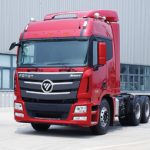Striking gold at the Olympics
The South African team did us proud at the Olympics (who would have thought that we would end up with a bakkie load of medals?). But I would like to pay tribute to an unappreciated yet equally praiseworthy contingent in London – the thousands of trucks that trawled the roads and ensured that the 16-day sporting spectacle was a resounding success.
Yes, I know I am biased. But it bugs me that no-one ever sings trucks’ praises. Let a truck lose its load on the highway and everyone goes ballistic. On the other hand, let a truck do a decent job (and, let’s face it, they mostly do) … and no-one says a word.
Well that’s about to change in this column. I would like to pay tribute to the trucks at the Olympics – and the medal-winning job that they performed. Without those trucks, some 10 490 athletes, 5 770 team officials, 2 961 technical officials, 21 000 members of the world’s media and 800 000 ticketed spectators would have starved.
The logistics of the event were an incredible feat – this is, after all the biggest peace-time logistical event in the world – and, by all accounts, the Olympics ran very smoothly. A total of 14 million meals were served at the Games; the Olympic Village alone served 45 000 meals a day. This required 304 800 m² of warehouse space and some 15 000 truck deliveries. Performance like this doesn’t just happen. It took years of preparation on the part of the freight industry to put their plans into practice.
Following the sensational opening ceremony at the Olympic Park, four million extra visitors descended on London and the other Games venues. Naturally, it was essential to keep the supply chain moving throughout the Olympics. Careful planning ensured that fresh produce arrived in restaurants, that the supermarket shelves were kept stocked … and, of course, there was the massive clean-up operation after each day as the visitors retired for the night, which also involved trucks. Oh, and don’t forget the all-important beer trucks – without which the Brits would not have been able to do their customary binge drinking.
It was an enormous effort, which was led by the Freight Transport Association (FTA). Just in case you don’t know the FTA, this organisation was established back in 1889 and is one of the UK’s largest trade associations. It represents the transport interests of companies moving goods by road, rail, sea and air.
According to Natalie Chapman, the FTA’s head of policy in London, the organisation was heavily involved in the extensive planning ahead of the Olympics, helping its 14 000 members get ahead of the Games. “We planned for years,” she says. “We had to contend with vehicle breakdowns, collisions, burst water mains and protests, all of which impacted on London’s congested road network. FTA developed a range of tools to inform and advise members as to when the unexpected happens.”
These tools included a dedicated FTA Olympic microsite; an Olympics app for iPhone and Android; regular bulletins and alerts from Transport for London; and live traffic updates delivered to offices, laptops and drivers’ smartphones. A dedicated FTA Olympic Advisor worked in the FTA Member Advice Centre, while the organisation also produced pre-printed cards for drivers reminding them of the new signs they would encounter and the rules for use of the Olympic Route Network (a network of roads linking all competition venues and other key sites, such as Heathrow Airport). Night-time deliveries were necessary, and the FTA also provided support and guidance in this regard.
Many of the roads were closed during the event, and the FTA developed a nifty route planning tool which helped members deliver their loads timeously and efficiently.
Yet another point of emphasis during the Olympics was the environment (the Olympic organisers made a point of stating that they were striving to put on the greenest and most ethical games ever), and transport operators came to the party in this regard too. For instance, UPS added 10 large biomethane diesel trucks to its dedicated 2012 London Olympics fleet. In a similar vein, Coca-Cola purchased a fleet of 14 biogas trucks for the delivery of drinks to the London area at Games time. Each vehicle has a carbon footprint half that of a typical diesel truck. It also invested in a low carbon warehousing and storage facility equipped with various energy-efficient technologies (it is partly powered by photovoltaic cells on its roof, and uses ground source heat pumps to provide low-energy heating and cooling).
So the trucks at the Olympics didn’t just ensure that the participants and spectators could eat, drink and be merry … they also minimised their impact on our planet in the process. I reckon that deserves a medal or two.
Published by
Focus on Transport
focusmagsa




